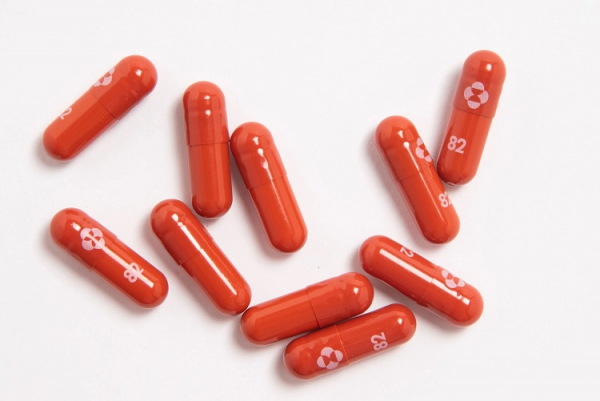
In the past few months Merck's Molnupiravir, an over the counter pill geared towards dramatically reducing COVID symptoms in severely ill patients, became one of two of Big Pharma's offerings for the pandemic.
Its preliminary clinical trial results showed that it could significantly reduce hospitalizations and deaths from COVID. But more recently, the drug has been shown to be not as effective as initially thought and have some impactful side effects as well.
According to Nature, recent studies on Molnupiravir showed a "decreased the risk of hospitalization from COVID-19 by 30% - down from a 50% reduction observed early in the trial." In comparison, monoclonal antibody treatments can reduce the risk of severe COVID by up to 85%.
Moreover, the Food and Drug Administration is now determining how in the process of defeating the coronavirus, the drug may also have "the potential to cause mutations in human DNA," New York Times reported.
Scientists are especially concerned about pregnant women who may potentially take Molnupiravir, as the drug may affect an unborn child's dividing cells, which may lead to birth defects. These were just some of the concerns raised by the FDA expert committee that met during a discussion on November 30.
"Do we want to reduce the risk for the mother by 30 percent while exposing the embryo and the fetus to a much higher risk of harm by this drug?" challenged Meharry Medical College Dr. James Hildreth from Tennessee. "My answer is no, and there is no circumstance in which I would advise a pregnant woman to take this drug."
The FDA expert committee members also raised concerns over "men wanting to become fathers," because the effects of Molnupiravir "remain poorly understood" for that category, The Gateway Pundit reported. The reason behind this is that when Molnupiravir is processed within the human body, it creates compounds that are very much like the building blocks of RNA, genetic material found inside the coronavirus. Molnupiravir works to insert enough errors in the coronavirus' MRA so that it would eventually fail to survive. Because it would make more and more mistakes, the coronavirus should weaken, allowing the human body's immune response to fight back.
However, the report said, "the same compound that interferes in the replication of the virus's genetic material can also be transformed into one that resembles a building block of DNA." Scientists are concerned that this may cause errors in a human body's own DNA or that of a developing fetus. This is backed by a study by researchers at the University of North Carolina, who studied Molnupiravir on isolated hamster cells.
Researchers found that in the span of 32 days, Molnupiravir induced mutations in DNA, which could "contribute to the development of cancer, or cause birth defects either in a developing fetus or through incorporation into sperm precursor cells," the study authors wrote.
Nothing to see here, just the New York Times casually mentioning that Merck’s new miracle COVID drug…
Might actually mutate healthy human DNA by accident. pic.twitter.com/WYVgKetOU2— Cabot Phillips (@cabot_phillips) December 13, 2021
Dividing cells are "relatively sparse" in adults, however, HIV researcher Ronald Swanstrom at the University of North Carolina at Chapel Hill who co-led the hamster cell study remarked that humans actually have enough dividing cells in the bones and gut to cause concern over the effects of Molnupiravir.
Janet Cragan, a medical officer at the U.S. Centers for Disease Control and Prevention who voted at the advisory committee meeting, remarked, "I don't think you can ethically say it's OK to give this drug in pregnancy."
Structural biology expert Elizabeth Campbell at the Rockefeller University, who also studies coronavirus antivirals, echoed the same sentiment, saying, "If I was pregnant, I wouldn't take this. I probably would go so far as to say I wouldn't give it to a child, a teenager, anyone whose cells are still dividing and differentiating at higher rates."












